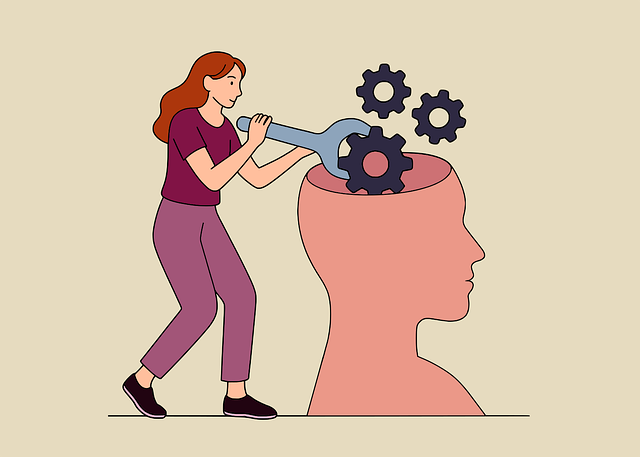Neighborhood Mental Health Clinics are community resources providing accessible and tailored mental health services, breaking down barriers to care. By offering flexible scheduling, culturally sensitive approaches, and partnerships with local organizations, these clinics foster trust and reduce stigma. The integration of technology, such as telehealth, further enhances accessibility, especially for remote or vulnerable populations. These clinics play a vital role in addressing diverse communities' unique mental health needs, demonstrated through successful case studies implementing various models to improve overall well-being.
Neighborhood mental health clinics play a vital role in community care, offering accessible and localized mental health services. This article delves into the transformative potential of these clinics, exploring their benefits for accessible counseling and community engagement. We identify key features of effective neighborhood clinics and discuss strategies to overcome stigma. Additionally, we examine the integration of technology through telehealth and its impact on mental health counseling. Finally, we present case studies highlighting successful neighborhood mental health initiatives.
Understanding Neighborhood Mental Health Clinics: Their Role in Community Care

Neighborhood Mental Health Clinics play a pivotal role in community care, offering accessible and tailored mental health services to diverse populations. These clinics are designed to bridge the gap between traditional healthcare settings and individuals who may face barriers to seeking counseling due to geographic, economic, or cultural reasons. By bringing mental health resources directly into communities, they foster a sense of comfort and encourage more people to access much-needed support.
The focus on community care ensures that mental health counseling becomes an integral part of the neighborhood fabric, promoting overall well-being. These clinics often employ culturally sensitive approaches, catering to various ethnic backgrounds and beliefs. They also tend to offer flexible scheduling options, including evenings and weekends, to accommodate the unique needs of working individuals and families. This accessibility is key to reducing stigma and encouraging proactive mental health management within communities.
Benefits of Localized Mental Health Services for Accessible Counseling

Local community mental health clinics offer a multitude of benefits in enhancing accessibility to mental health counseling. By establishing these services within neighborhoods, individuals can receive support that is both convenient and culturally sensitive. This proximity reduces barriers often associated with traditional healthcare settings, encouraging more people to seek help for their psychological well-being.
These localized clinics cater to diverse populations, ensuring that a wide range of individuals, regardless of socio-economic status or geographical location, have equal access to counseling services. The community-based approach fosters trust and encourages open communication, allowing for more effective mental health management. This personalized and readily available support can significantly improve overall well-being and empower individuals to take charge of their mental health.
Identifying Key Features of Effective Neighborhood Clinics

Effective neighborhood mental health clinics are characterized by several key features that foster a supportive and accessible environment for individuals seeking mental health counseling. Firstly, they are located in areas with high need, ensuring easy access for local residents. These clinics often operate extended hours, including evenings and weekends, to accommodate diverse work schedules and accommodate urgent needs.
Additionally, successful neighborhood clinics prioritize building strong community connections through partnerships with local organizations, schools, and faith-based groups. This collaborative approach enhances trust and encourages open dialogue about mental health. The clinics also typically offer a range of services tailored to various demographics and cultural backgrounds, ensuring that unique needs are met with culturally competent care.
Building Trust and Overcoming Stigma: Strategies for Community Engagement

Building trust and overcoming stigma are essential strategies for engaging communities with neighborhood mental health clinics. To foster trust, clinics must prioritize transparency and cultural competency, understanding and respecting diverse community beliefs and practices related to mental health. This involves educating both staff and patrons about various therapeutic approaches, ensuring confidentiality, and creating welcoming environments that reflect the values of the surrounding neighborhood.
Overcoming stigma requires a multi-faceted approach, including public awareness campaigns, peer support programs, and collaborative partnerships with local organizations. By normalizing conversations around mental health and highlighting the benefits of mental health counseling, communities can reduce fear and judgment. Engaging in open dialogue, sharing success stories, and providing accessible resources can help dispel myths and encourage individuals to seek support for their well-being.
Integrating Technology: Telehealth and Its Impact on Mental Health Counseling

The integration of technology, particularly telehealth, has revolutionized mental health counseling by breaking down geographical barriers and making services more accessible. Through video conferencing, patients can now connect with counselors from the comfort of their homes, eliminating travel time and enhancing convenience. This shift is especially beneficial for individuals in remote areas or those with limited mobility, ensuring they receive necessary support without delays.
Telehealth also offers increased flexibility in terms of appointment scheduling, catering to diverse patient needs. Moreover, it provides a safe and confidential space for vulnerable populations who may feel more at ease engaging in counseling sessions remotely. With advancements in digital platforms, therapists can utilize various interactive tools and techniques, making sessions dynamic and personalized, thus improving overall mental health counseling outcomes.
Challenges and Solutions in Sustaining Neighborhood Clinic Success

Neighborhood mental health clinics face unique challenges in providing consistent, quality care. One significant hurdle is ensuring access to services for underserved populations, such as low-income individuals and people of color, who may face additional barriers like transportation or cultural stigma. Addressing these disparities requires a multifaceted approach. Community engagement and partnerships with local organizations can help build trust and encourage clinic utilization. Culturally competent practices, including providing counseling in multiple languages and addressing cultural norms, are essential for attracting diverse patients.
Sustainable success also hinges on maintaining a skilled workforce. High turnover rates among mental health professionals can disrupt services. To combat this, clinics should offer competitive compensation packages, opportunities for professional development, and supportive work environments. Additionally, implementing innovative models of care, like tele-mental health services, expands reach while ensuring continuity. By embracing these solutions, neighborhood clinics can overcome challenges and continue offering vital mental health counseling to their communities.
Case Studies: Real-Life Examples of Successful Neighborhood Mental Health Initiatives

Neighborhood mental health clinics have gained prominence as effective initiatives, offering accessible mental health counseling to diverse communities. Case studies from various regions highlight their success in addressing local needs and promoting well-being. For instance, a community-based program in an urban setting focused on providing culturaly sensitive therapy to immigrant populations, resulting in improved access and reduced barriers to care. In contrast, a rural initiative implemented mobile clinics and teletherapy sessions, ensuring individuals in remote areas received necessary mental health services despite limited infrastructure.
These real-life examples demonstrate the adaptability and impact of neighborhood mental health clinics. By tailoring services to specific communities, these initiatives foster trust, encourage open dialogue, and ultimately improve mental health outcomes. The success stories serve as a blueprint for other regions, emphasizing the value of community engagement in shaping effective and sustainable mental health care solutions.
